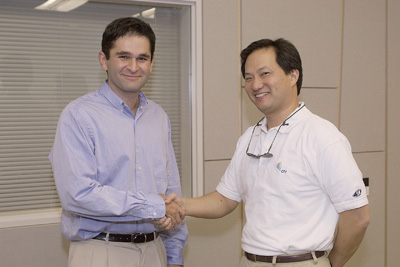New Director Takes Over at UC San Diego's Center for Networked Systems
December 22, 2005 / By Doug Ramsey
San Diego, CA, December 22, 2005 -- One of the youngest research centers on the University of California, San Diego campus has a new leader. Jacobs School of Engineering professor Amin Vahdat is the second director of the Center for Networked Systems (CNS) since it was established in July 2004. Vahdat, who is also an academic participant in the California Institute for Telecommunications and Information Technology (Calit2), takes the reins from founding director Andrew Chien, who left to join Intel Corporation as Director of Research.
|
The industry-funded CNS also announced today the recent addition of four new faculty members, bringing its total to 18. Professors Alin Deutsch, Yannis Papakonstantinou, and Tajana Simunic Rosing come from UCSD's Computer Science and Engineering (CSE) department, while Tara Javidi is on the Electrical and Computer Engineering faculty.
"UCSD has amassed a world-class reputation in areas such as security, networking, and experimental systems," said Vahdat, an associate professor in CSE. "We have expertise from the lowest level of networking -- optical, wireless -- all the way up to the highest level of end-to-end network services. The center can bring all these people together and focus them on a lot of emerging opportunities."
The 33-year-old computer scientist joined the Jacobs School faculty in January 2004 from Duke University, where he achieved tenure in just four years. He completed his undergraduate and graduate work at UC Berkeley, where he received his Ph.D. in computer science in 1998. After Berkeley, Vahdat worked briefly as a research associate at the University of Washington before going to Duke. His honors include an Alfred P. Sloan Fellowship (2003), IBM Faculty Partnership Award (2002-03) and NSF CAREER Award (2000).
|
"With his own focus on distributed systems, computer networks, operating systems, and mobile computing, Professor Vahdat is in a unique position to bring together researchers who come from systems or networking backgrounds," said Jacobs School Dean Frieder Seible. "He was also an obvious choice for the center's industry members, given his track record in applied research, notably on new network architectures."
CNS's four corporate members -- AT&T, Hewlett-Packard, QUALCOMM and Sun Microsystems -- provide funding for projects jointly developed by center faculty and industry partners. They also have a voice in shaping CNS's research agenda. "By working with the best networking and systems companies in the world, we can gain an understanding of what problems to work on from the corporate perspective," said Vahdat. "We then bring our expertise to bear on those problems. It is a synergistic situation, and it gives corporate members access to a one-stop shop with some of the leading academic experts in the world."
|
More than 50 graduate students typically work on CNS research projects, either on campus during the school year or as corporate interns during the summer. The benefits, claims Vahdat, are two-way. "Some students' doctoral dissertations grew out of their internships, as did many research papers," he explained. "From a company perspective, these internships are one of the biggest value-added attractions of CNS. Some interns have had significant operational impact on the company, and hosting them during the summer acts as a force multiplier for the many efforts underway at member companies. It also gives them a chance to get to know the students for recruiting purposes."
CNS hopes to expand its corporate membership, but its new director says that bringing in money is not the main goal. "Money is secondary to the research relationship," he said. "If we aren't looking forward to interacting with people at the company on a regular basis, or if we don't want to send students there for internships every year, then it is probably not the right company for us to interact with."
Vahdat's own research focuses on building scalable, high-performance, highly available Internet systems. He has spent the past ten years working on infrastructure and abstractions needed to support wide-area applications that are geographically distributed, highly available, and dynamically reconfiguring. "As the Internet has evolved and grown exponentially, it has become increasingly dynamic and unpredictable, with networks constantly being added and removed and traffic always changing," said Vahdat. "My group is investigating how systems can self-organize and dynamically react to the changing characteristics of the network to achieve peak performance and availability."
Vahdat will continue his own research even as he takes on the role of administering CNS with its facilities in the new CSE and Calit2 buildings. He is the principal investigator on one of the center's newest projects, to study "agile, efficient resource configuration and scheduling with virtual clusters," approved last July. Vahdat is also co-PI on four other ongoing CNS projects.
Meanwhile, CNS will stage its next half-yearly Research Review on January 25-26, to be held in the Calit2 Auditorium on the La Jolla campus. Faculty will report on their latest research findings, and graduate students will showcase their research in a poster session. Attendees will also hear from invited speakers, including Dave Belanger, Chief Scientist of AT&T Labs.
Related Links
Amin Vahdat Website
Center for Networked Systems
Computer Science and Engineering Department
Electrical and Computer Engineering Department
Calit2
Media Contacts Media Contact: Doug Ramsey, (858) 822-5825, dramsey@ucsd.edu




